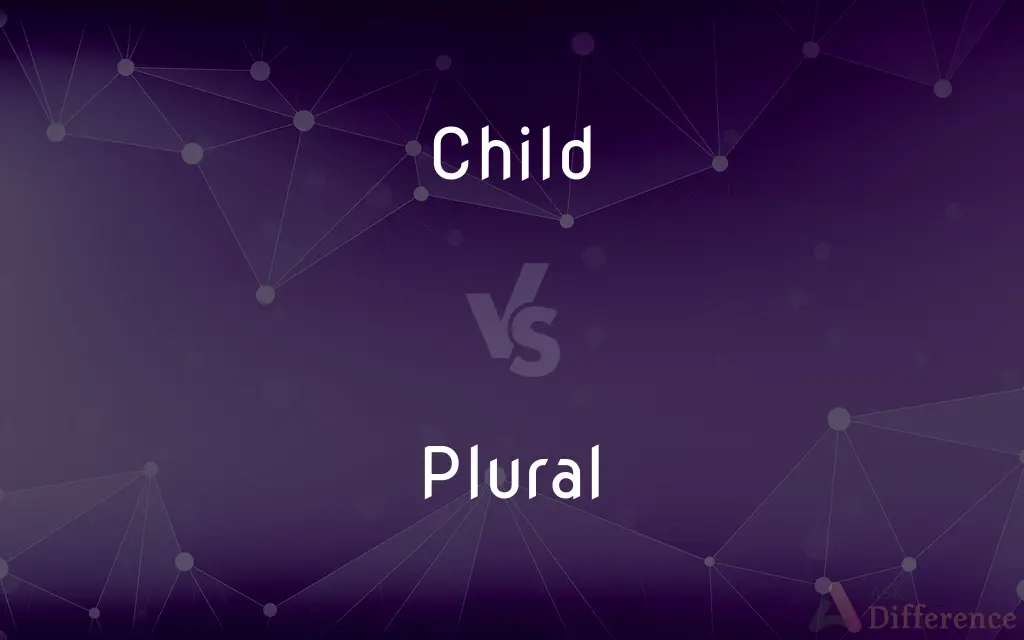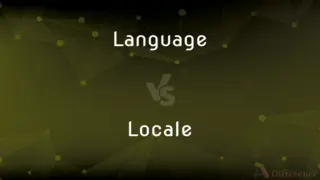Child vs. Plural — What's the Difference?

Difference Between Child and Plural
ADVERTISEMENT
Compare with Definitions
Child
Biologically, a child (plural children) is a human being between the stages of birth and puberty, or between the developmental period of infancy and puberty. The legal definition of child generally refers to a minor, otherwise known as a person younger than the age of majority.
Plural
The plural (sometimes abbreviated PL), in many languages, is one of the values of the grammatical category of number. The plural of a noun typically denotes a quantity greater than the default quantity represented by that noun.
Child
A person between birth and puberty.
Plural
Relating to or composed of more than one member, set, or kind
The plural meanings of a text.
A plural society.
Child
A person who has not attained maturity or the age of legal majority.
ADVERTISEMENT
Plural
(Grammar) Of or being a grammatical form that designates more than one of the things specified.
Child
An unborn infant; a fetus.
Plural
The plural number or form.
Child
An infant; a baby.
Plural
A word or term in the plural form.
Child
One who is childish or immature.
Plural
Consisting of or containing more than one of something.
The notion of culture is one whose meanings are plural and shifting.
Child
Someone to whom a specified person is a parent.
Plural
(grammar) In systems of number, not singular or not singular or dual.
English nouns usually have singular and plural forms.
Child
A member of a tribe; descendant
Children of Abraham.
Plural
(comparable) Pluralistic.
Child
An individual regarded as strongly affected by another or by a specified time, place, or circumstance
A child of nature.
A child of the Sixties.
Plural
The plural number. In English, referring to more or less than one of something.
Child
A product or result of something specified
“Times Square is a child of the 20th century” (Richard F. Shepard).
Plural
A word in the form in which it potentially refers to something other than one person or thing; and other than two things if the language has a dual form.
The plural of 'cat' is 'cats', but the plural of 'child' is 'children'.
Child
A person who has not yet reached adulthood, whether natural (puberty), cultural (initiation), or legal (majority).
Go easy on him: he is but a child.
Plural
A person with some form of multiplicity, particularly dissociative identity disorder.
Child
A kid aged 1 to 11 years, whereas neonates are aged 0 to 1 month, infants are aged 1 month to 12 months, and adolescents are aged 12 years to 18 years.
Regular chores can be appropriate for both children and adolescents, given age-appropriate limits on difficulty level and time on task.
Plural
Relating to, or containing, more than one; designating two or more; as, a plural word.
Plural faith, which is too much by one.
Child
(with possessive) One's direct descendant by birth, regardless of age; one's offspring; a son or daughter.
My youngest child is forty-three this year.
His adult children visit him yearly.
Plural
The plural number; that form of a word which expresses or denotes more than one; a word in the plural form.
Child
(cartomancy) The thirteenth Lenormand card.
Plural
The form of a word that is used to denote more than one
Child
(figurative) A figurative offspring, particularly:
Plural
Grammatical number category referring to two or more items or units
Child
A person considered a product of a place or culture, a member of a tribe or culture, regardless of age.
The children of Israel.
He is a child of his times.
Child
Anything derived from or caused by something.
Child
(computing) A data item, process, or object which has a subservient or derivative role relative to another.
The child node then stores the actual data of the parent node.
Child
Youth of noble birth
Child
(mathematics) A subordinate node of a tree.
Child
A female child, a girl.
Child
To give birth; to beget or procreate.
Child
A son or a daughter; a male or female descendant, in the first degree; the immediate progeny of human parents; - in law, legitimate offspring. Used also of animals and plants.
Child
A descendant, however remote; - used esp. in the plural; as, the children of Israel; the children of Edom.
Child
One who, by character of practice, shows signs of relationship to, or of the influence of, another; one closely connected with a place, occupation, character, etc.; as, a child of God; a child of the devil; a child of disobedience; a child of toil; a child of the people.
Child
A noble youth. See Childe.
Child
A young person of either sex. esp. one between infancy and youth; hence, one who exhibits the characteristics of a very young person, as innocence, obedience, trustfulness, limited understanding, etc.
When I was child. I spake as a child, I understood as a child, I thought as a child; but when I became a man, I put away childish things.
Child
A female infant.
A boy or a child, I wonder?
Child
To give birth; to produce young.
This queen Genissa childing died.
It chanced within two days they childed both.
Child
A young person of either sex;
She writes books for children
They're just kids
`tiddler' is a British term for youngsters
Child
A human offspring (son or daughter) of any age;
They had three children
They were able to send their kids to college
Child
An immature childish person;
He remained a child in practical matters as long as he lived
Stop being a baby!
Child
A member of a clan or tribe;
The children of Israel
Share Your Discovery

Previous Comparison
Curl vs. Swirl
Next Comparison
Language vs. Locale













































